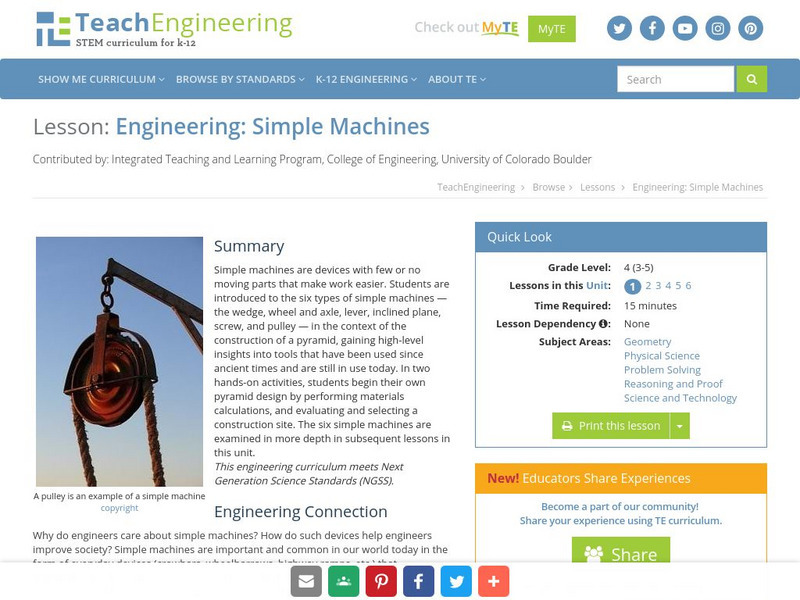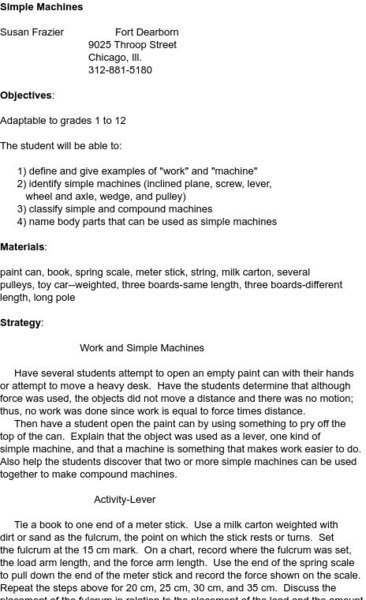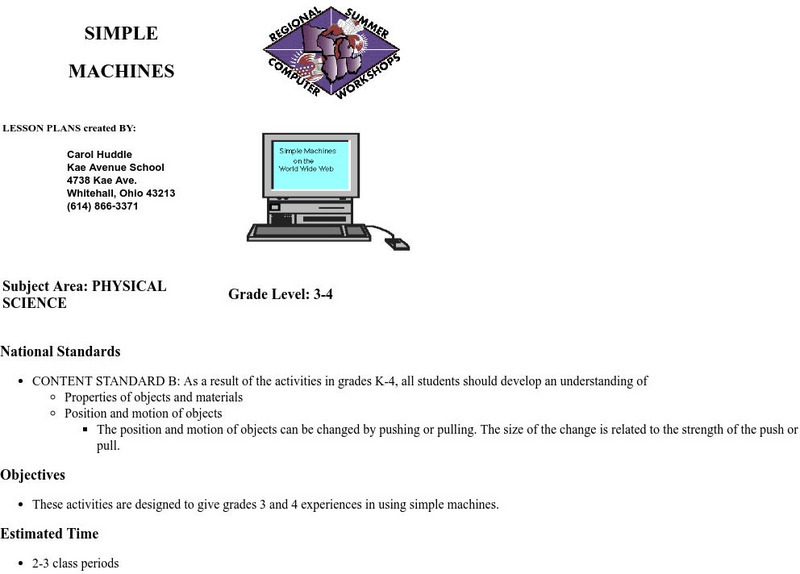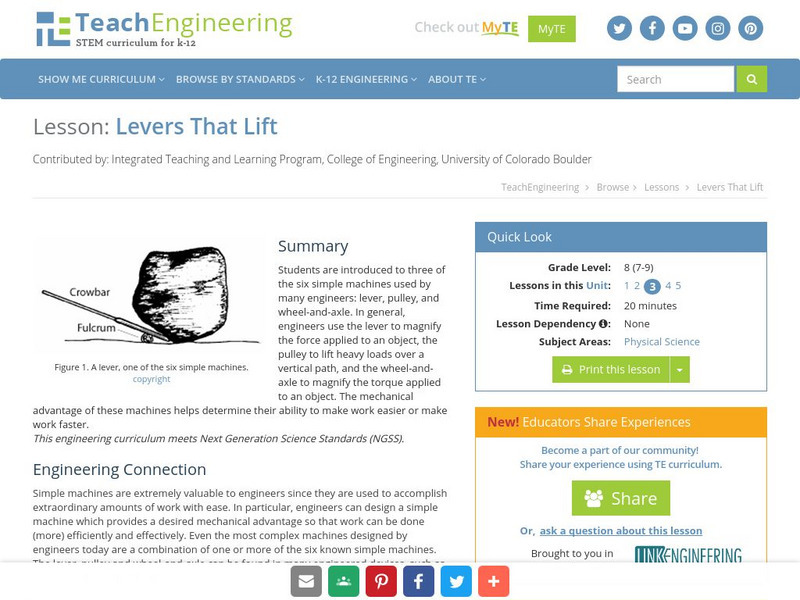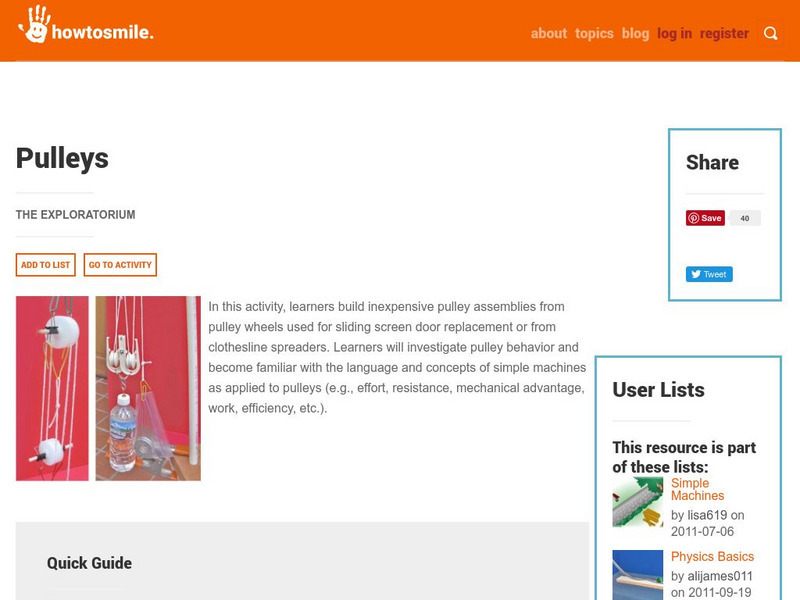Curated OER
We Have Work To Do - Science
Young scholars begin to think of ways to make work easier. They will focus on ways to extend their abilities to lift heavy things. They will identify levers, pulleys, and inclined planes through the examination of concrete objects and...
Curated OER
Medieval Catapults
Students design and build a working catapult or trebuchet to explore the concepts of force, motion, and distance.
Curated OER
Fire Safety in the Home
Students discover the importance of fire safety. In this fire prevention lesson, students identify problems in a house that could lead to a fire and draw their own homes that include the appropriate fire prevention tools. The students...
Curated OER
Forces Applied to an Object
Fourth graders predict, observe, and compare what happens when a force is applied to an object. In this forces lesson, 4th graders complete a 'swinging hammer' activity to learn about forces and motion.
Curated OER
Levers
Students brainstorm if they think that any lever would use the same amount of paperclips. They break into small groups and use a data sheet as well as a lever, Lego person, fulcrum, and some paperclips and prove what they think by taking...
Curated OER
What Can You Make of It?
Students investigate the various uses of a paper cup. In this scientific inquiry lesson, students investigate various ways to use a paper cup by identifying its characteristics. Students sketch their discovery.
Curated OER
Children's Literature Across the Curriculum Ideas-The Gadget War
Students read The Gadget War by Betsy Duffey. They complete a variety of cross-curricular activities surrounding inventors and inventions. Included are reading, art, math, science, writing, social studies, and library connections.
Curated OER
Designing a Safe City Like a Civil Engineer
Students study civil engineering, safety apparatuses in their city, and design their own city. In this civil engineering activity, students discuss their towns safety apparatuses and define civil engineers. Students then design their own...
Curated OER
The Saturday Morning Superhero:
Students explore the concept of engineering design. In this engineering design process lesson, students read The Saturday Morning Superhero and discuss the problem solving steps that the main character encounters as he creates a...
Curated OER
Sparky's Engineer Activity Book
Students complete their Sparky's Engineer Activity Book. For this engineering lesson, students are guided by their teacher in completing their Sparky's Engineer Activity Book which reviews what engineers make and what tools and materials...
Curated OER
Build a Space Shuttle
Pupils explore the concept of space. In this space lesson plan, students pretend to be aerospace engineers. Pupils build space ships out of cardboard tubes. Students discuss what aerospace engineers do. Pupils model their space ships...
Curated OER
Wheel & Axle Tractor
Young scholars design and build a tractor using LEGO materials. They write and draw their designs.
SEDL
Southwest Educational Development Laboratory: Simple Machines [Pdf]
This large PDF file contains seven lessons on simple machines. Includes illustrations. Requires Adobe Reader.
TryEngineering
Try Engineering: Simple Machines
The purpose of this lesson is to learn about the different types of simple machines and their uses. PDF (requires Adobe Reader) and RTF (requires Word or Notebook).
Alabama Learning Exchange
Alex: Inventions Using Simple Machines Project
Students will have completed a unit on the six simple machines (lever, inclined plane, pulley, wedge, screw, and wheel and axle) before beginning this project. Students will choose to investigate an invention composed of one or more...
Alabama Learning Exchange
Alex: Simple Machines
During this lesson, students learn about the six types of simple machines. They define each type of machine, experiment with each type, utilize the Internet to explore each type of machine and build their own simple machine. This lesson...
TeachEngineering
Teach Engineering: Engineering: Simple Machines
Simple machines are devices with few or no moving parts that make work easier. Students are introduced to the six types of simple machines - the wedge, wheel and axle, lever, inclined plane, screw, and pulley - in the context of the...
Alabama Learning Exchange
Alex: How to Make Something Simple, Hard
Middle schoolers will have completed a unit of forces and motion prior to the current unit of study on simple machines (lever, inclined plane, screw, wedge, pulley, wheel and axle). Students will review the functions and examples of...
Science and Mathematics Initiative for Learning Enhancement (SMILE)
Smile: Simple Machines (Grades 1 To12)
In this lesson plan learners start by trying to open a paint can with their bare hands. Eventually, they will use a lever to open it. Various activities are used to enforce different simple machines.
NASA
Nasa: Simple Machines
A lesson plan site that contains activities designed to give grades 3 and 4 experiences in using simple machines.
TeachEngineering
Teach Engineering: Simple Machines and Modern Day Engineering Analogies
Students apply the mechanical advantages and problem-solving capabilities of six types of simple machines (wedge, wheel and axle, lever, inclined plane, screw, pulley) as they discuss modern structures in the spirit of the engineers and...
TeachEngineering
Teach Engineering: Levers That Lift
This lesson introduces students to three of the six simple machines used by many engineers: the lever, the pulley, and the wheel-and-axle. In general, engineers use the lever to magnify the force applied to an object, the pulley to lift...
TeachEngineering
Teach Engineering: Powerful Pulleys
Students continue to explore the story of building a pyramid, learning about the simple machine called a pulley. They learn how a pulley can be used to change the direction of applied forces and move/lift extremely heavy objects, and the...
Other
How to smile.org: Building Pulleys
An activity where students use pulley systems to pick up a paint can and move an eraser from the ground to the top of a desk. After completing this activity, students will understand how pulley systems can help us do work.









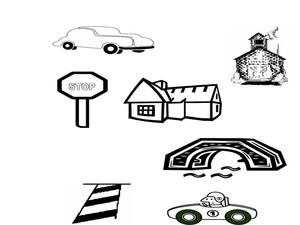
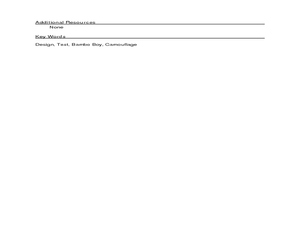

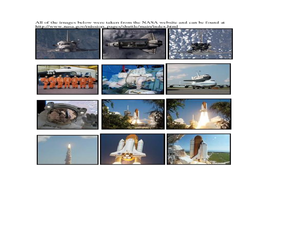
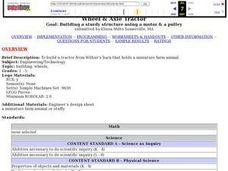
![Southwest Educational Development Laboratory: Simple Machines [Pdf] Lesson Plan Southwest Educational Development Laboratory: Simple Machines [Pdf] Lesson Plan](https://d15y2dacu3jp90.cloudfront.net/images/attachment_defaults/resource/large/FPO-knovation.png)


